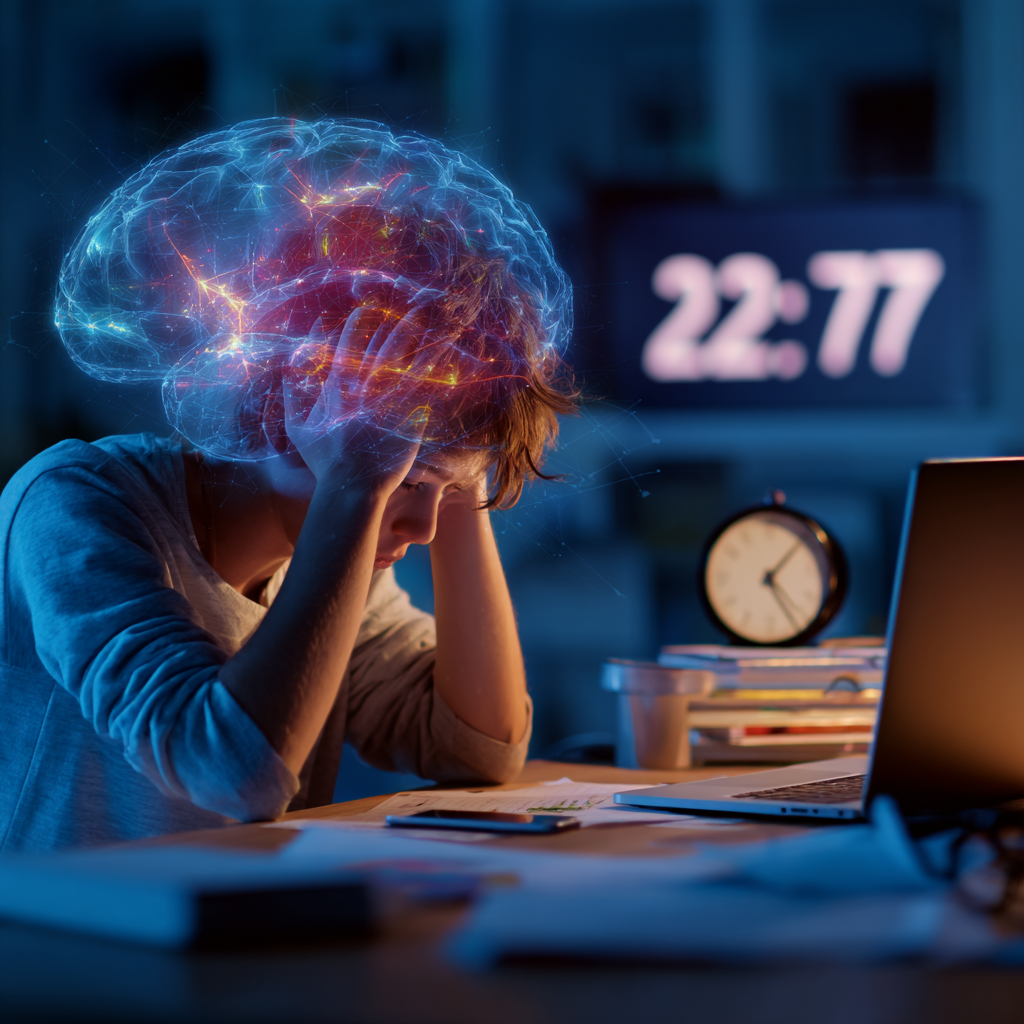How Anxiety Affects the Brain’s Memory: When Sleep Disorders Create Distinct Memory Disruption Patterns

Story-at-a-Glance
- Different anxiety presentations create unique memory disruption patterns – social anxiety affects working memory differently than generalized anxiety affects long-term consolidation
- Sleep disruption amplifies anxiety’s memory effects through altered hippocampus-amygdala communication during crucial memory consolidation windows
- The 2024 election triggered widespread sleep-memory problems, with 46% of Americans losing sleep over political anxiety, directly impacting cognitive function
- REM sleep specifically protects against anxiety-driven memory fragmentation by regulating fear extinction and emotional memory processing
- Young adults show the most severe anxiety-memory-sleep interactions, particularly around social media exposure and academic performance stress
- Memory consolidation failures from anxiety create a vicious cycle – poor memory performance increases anxiety, which further disrupts sleep and memory formation
Mike stares at his laptop screen at 2 AM, the cursor blinking mockingly in an empty document. The 20-year-old college student has been trying to write his psychology paper for hours, but his mind keeps replaying the “stupid” things he said during class discussion earlier.
When meeting new people, he has a hard time concentrating on the interaction because he is busy worrying about what they will think of him. What Mike doesn’t realize is that understanding how anxiety affects the brain’s memory reveals something profound—his social anxiety isn’t just making him feel uncomfortable, it’s fundamentally rewiring how his brain processes and stores memories, especially during the sleep he’s currently missing.
How anxiety affects the brain’s memory represents one of neuroscience’s most compelling puzzles. While we’ve long known that anxious people struggle with memory, recent breakthroughs reveal something far more nuanced: different types of anxiety create distinct memory disruption patterns, particularly when sleep disorders enter the equation.
The Neuroscience Behind Anxiety’s Memory Hijacking
Dr. Edward Pace-Schott, Assistant Professor at Harvard Medical School and researcher at Massachusetts General Hospital, has spent his career examining how sleep disruption amplifies anxiety’s impact on memory systems. His groundbreaking research reveals that sleep is critical for extinction memory consolidation, a process central to exposure therapy used to treat anxiety disorders.
“The relationship between anxiety, sleep, and memory isn’t linear—it’s a complex dance where each partner influences the others,” explains Pace-Schott. Poor sleep quality predicts worse anxiety disorder treatment outcomes, while studies in specific phobia and social anxiety disorder indicate that the memory consolidation effects of sleep can be leveraged to enhance the retention of extinction memories during exposure therapy.
The brain’s memory systems operate like a sophisticated filing cabinet, but anxiety acts like an overzealous security guard. During sleep, coordinated reactivations occur between the hippocampus and the basolateral amygdala during sharp wave-ripples of sleep following emotional learning.
These reactivations are stronger for anxiety-provoking memories than for ‘safe’ memories.
This isn’t just academic theory. Consider George, a 23-year-old student whose case study was published in Health Psychology Research. George was diagnosed with social anxiety disorder and specific phobia situational type. He was complaining of panic attacks that severely disrupted his sleep patterns. His memory problems weren’t random—they followed specific patterns based on his anxiety type.
Social Anxiety vs. Generalized Anxiety: Different Memory Signatures
Recent research reveals that how anxiety affects the brain’s memory depends critically on which type of anxiety someone experiences. Professor Matthew Walker, director of Berkeley’s Center for Human Sleep Science, has discovered that overnight sleep deprivation triggers anxiety as well as altered brain activity patterns in healthy adults, revealing that sleep loss can cause anxiety, suggesting a vicious cycle.
Social anxiety primarily disrupts working memory and attention. In Mike’s case, when meeting new people, he has a hard time concentrating on the interaction because he is busy worrying about what they will think of him—he assumes they will find him “dumb,” “boring,” or a “loser.”
When he loses his concentration, he stutters, is at a loss for words, and starts to sweat. This creates what researchers call “cognitive load interference”—his brain’s RAM is essentially being hogged by anxiety processes, leaving little space for new memory formation.
Generalized anxiety, by contrast, affects long-term memory consolidation more profoundly. Sleep deprivation affects fear memory consolidation through bi-stable amygdala connectivity with insula and ventromedial prefrontal cortex. Sleep-deprived subjects demonstrate increased fear ratings and altered functional connectivity between the amygdala and several brain regions.
Additionally, there’s fascinating research on specific phobias showing yet another pattern. Patients with specific phobias experience anxiety and panic attacks along with unreasonable fear of exposure or anticipated exposure to a phobic stimulus. The anxiety response goes beyond normal apprehension and leads to avoidance behavior, creating memory patterns that prioritize threat-related information at the expense of neutral memories.
The 2024 Election: A Real-World Case Study in Collective Memory Disruption
The recent 2024 presidential election provided researchers with an unprecedented real-world laboratory for studying how anxiety affects the brain’s memory on a population scale. A survey commissioned by the American Academy of Sleep Medicine reveals that nearly half (46%) of Americans are losing sleep due to anxiety surrounding the 2024 presidential election.
But this wasn’t just about sleep loss—it was about memory disruption. A study published in Psychiatry Research found that stress related to election news and the buildup before the election was linked to higher risks of depression and anxiety among young adults.
Election anticipatory stress and news-related stress were associated with higher odds of risk for at least moderate major depressive disorder.
Dr. Lynn Bufka, a licensed psychologist and stress expert at the American Psychological Association, explains: “Getting enough sleep is especially important when we’re dealing with stressful situations. If we don’t have adequate sleep, then we’re less prepared to handle what’s coming our way”.
The election research revealed something crucial about how anxiety affects the brain’s memory: stress from constant exposure to news—especially on social media—may play a major role in shaping young adults’ emotional responses to elections. Because young people are more likely to get their news online, they may be more affected by the constant stream of political content.
This creates what I call “anxiety-induced memory fragmentation“—where the brain becomes so overwhelmed by stress signals that it cannot properly consolidate daily experiences into coherent memories.
The Sleep-Memory-Anxiety Triangle
The relationship between these three systems is more intricate than previously understood. Neuroimaging studies reveal significant activity increases during REM sleep in emotion-related regions both subcortically, in the amygdala, striatum and hippocampus, and cortically, in the insula and medial prefrontal cortex.
Here’s what happens during a typical night when anxiety disrupts memory consolidation:
- Initial Sleep Disruption – Anxiety elevates cortisol and norepinephrine, making it harder to fall asleep. The resulting hypernoradrenergic tone leads to heightened responsivity within the amygdala and viscerosensory cortical regions.
- REM Sleep Interference – Even when sleep occurs, anxiety alters REM sleep architecture. REM sleep allows for cortical strengthening, emotion dissipation, and reestablished prefrontal-amygdala regulatory control. When disrupted, emotional memories remain “hot” rather than being properly processed.
- Memory Consolidation Failure – Memory consolidation during sleep depends on coordinated interplay between cortical slow waves, thalamocortical sleep spindles and hippocampal ripples. Anxiety disrupts this delicate orchestration, leading to fragmented memory storage.
The Young Adult Memory Crisis
Current research reveals that young adults are experiencing the most severe anxiety-memory-sleep interactions in recorded history. Gen Z respondents were less likely than older voters to report experiencing negative emotions about the upcoming presidential election, but their anxiety is not necessarily related to presidential politics. Instead, it’s manifesting in what researchers call “digital anxiety overload.”
Consider the case of college students like Mike. Since starting college, he has been isolating more, turning down invitations from his roommate to go eat or hang out, ignoring his cell phone when it rings, and habitually skipping class. His concerns about how others view him are what drive him to engage in these avoidance behaviors.
This pattern is becoming increasingly common. Social media creates constant memory-formation demands while simultaneously triggering anxiety responses. The brain becomes caught in what Dr. Walker describes as a “cognitive traffic jam“—too much information competing for memory resources while anxiety hijacks the processing systems.
The result? Sleep-tracking technologies can exacerbate anxiety through “orthosomnia,” where users obsess over sleep metrics, creating yet another layer of memory-disrupting worry.
Breaking the Cycle: What Actually Works
Understanding how anxiety affects the brain’s memory points toward specific interventions that can break this destructive cycle. The key insight from recent research is that different anxiety types require different memory-focused treatments.
For Social Anxiety Memory Problems: Focus on working memory training and attention regulation. Virtual reality exposure therapy offers a unique opportunity to treat social anxiety disorder, with evidence showing individuals prefer VRET over in vivo exposure therapy. This approach allows controlled memory formation in anxiety-provoking situations.
For Generalized Anxiety Memory Issues: Target sleep architecture and REM sleep quality. Extended-release melatonin appears to improve cognitive functioning and sleep maintenance in patients with mild to moderate Alzheimer’s disease. A review found strong evidence that melatonin is better than placebo at reducing anxiety before surgery, suggesting its potential for anxiety-related memory problems.
For All Anxiety-Memory Problems: Dr. Bufka recommends what she calls “compartmentalization with intention.” She encourages her patients to develop habits that help them relax before bedtime and take their mind off of world events. For her, it’s doing number puzzles like sudoku. For others it might be snuggling with a pet or reading a fantasy or mystery novel.
This isn’t just stress management—it’s strategic memory protection. By creating dedicated “worry time” separate from sleep preparation, you allow your brain’s memory consolidation systems to function properly.
The Neuroplasticity Hope
Perhaps the most encouraging finding from recent research is that the brain’s memory systems retain remarkable plasticity. For healthy people, research shows that one night of recovery sleep brings systems back online and brings anxiety levels back to normal.
This suggests that how anxiety affects the brain’s memory isn’t a permanent sentence. With proper intervention—whether through therapy, sleep hygiene, or targeted treatments—the memory disruptions can be reversed.
However, there’s an important caveat that leading researchers acknowledge: additional research is needed to determine if adolescent exposure to these factors causes long-lasting effects that lead to mood and anxiety disorders. The brain’s memory systems are particularly vulnerable during developmental periods, making early intervention crucial.
Beyond Individual Solutions: A Societal Challenge
The research on election anxiety reveals something profound about modern life: how anxiety affects the brain’s memory has become a collective challenge requiring societal solutions. 46% of Americans report losing sleep over worries about the 2024 election, with broader concerns including financial stress (81%), job security (57%), global conflicts (54%), and emerging technologies like AI (41%).
This isn’t just personal—it’s a public health crisis. When nearly half the population experiences anxiety-driven memory disruption, it affects everything from workplace productivity to democratic participation. People with fragmented memories make different decisions than those with intact memory systems.
Dr. Pace-Schott’s research suggests that sleep therapy could reduce anxiety in non-clinical populations as well as people suffering from panic attacks, generalized anxiety disorder, post-traumatic stress disorder, and other conditions. This points toward preventive approaches that protect memory function before anxiety disorders fully develop.
The Memory-Emotion Regulation Connection
One of the most significant recent discoveries involves understanding how anxiety affects the brain’s memory through emotion regulation pathways. An intervening period of sleep, and specifically one containing REM sleep, subsequently promotes more rapid diminution of fear responses and beneficial re-engagement of ventromedial PFC involvement during post-sleep fear extinction recall.
This finding revolutionizes how we think about anxiety treatment. Traditional approaches focus on reducing anxiety symptoms, but the new research suggests we should also focus on protecting and restoring memory function. When memory systems work properly, they actually help regulate emotions and reduce anxiety.
The clinical implications are profound. Rather than treating anxiety and memory problems separately, integrated approaches that target the sleep-memory-anxiety triangle show the most promise.
FAQ
Q: How quickly can anxiety start affecting my memory? A: Research shows that overnight sleep deprivation triggers anxiety as well as altered brain activity patterns in healthy adults, meaning memory effects can begin immediately. However, one night of recovery sleep can restore normal function.
Q: Is the memory damage from anxiety permanent? A: No. For healthy people, research shows that one night of recovery sleep brings systems back online and brings anxiety levels back to normal. The brain’s memory systems retain remarkable plasticity and can recover with proper intervention.
Q: Why does social anxiety affect memory differently than other types? A: Social anxiety primarily disrupts working memory and attention because the brain’s processing capacity is overwhelmed by worry about others’ judgments during social interactions, leaving less cognitive resource for memory formation.
Q: What’s the connection between sleep spindles and memory consolidation? A: Memory consolidation during sleep depends on the coordinated interplay between cortical slow waves, thalamocortical sleep spindles and hippocampal ripples. Anxiety disrupts this coordination, leading to fragmented memory storage.
Q: Can melatonin help with anxiety-related memory problems? A: Extended-release melatonin appears to improve cognitive functioning, and a review found strong evidence that melatonin is better than placebo at reducing anxiety, suggesting potential benefits for anxiety-related memory issues.
Q: How does the 2024 election research apply to everyday anxiety? A: The election studies show that constant exposure to anxiety-provoking news, especially on social media, may play a major role in shaping emotional responses and memory disruption. This pattern applies to any chronic anxiety trigger.
Q: What is REM sleep and why is it important for memory? A: REM (Rapid Eye Movement) sleep is a stage of sleep characterized by rapid eye movements, vivid dreams, and high brain activity. During REM sleep, the brain processes emotional memories and helps regulate emotions, making it crucial for mental health and memory formation.
Q: What are the hippocampus and amygdala, and how do they relate to memory and anxiety? A: The hippocampus is a brain region essential for forming new memories and learning. The amygdala processes emotions, especially fear and anxiety. These two regions communicate during sleep to help store emotional memories properly. When anxiety disrupts this communication, memory problems occur.
Q: What is memory consolidation? A: Memory consolidation is the process by which the brain converts temporary, fragile memories into long-lasting, stable ones. This mainly happens during sleep when the brain “files away” the day’s experiences into long-term storage.
Q: What is working memory? A: Working memory is like your brain’s “mental notepad” – it temporarily holds and manipulates information you’re currently thinking about. For example, remembering a phone number long enough to dial it, or following directions while driving.
Q: What does “neuroplasticity” mean? A: Neuroplasticity refers to the brain’s ability to reorganize and form new connections throughout life. This means the brain can adapt, heal, and change, which is why memory problems from anxiety can often be reversed with proper treatment.
Q: What is extinction memory in relation to anxiety treatment? A: Extinction memory is the brain’s ability to learn that a previously feared situation is now safe. It’s the foundation of exposure therapy – when someone learns through repeated safe experiences that their fear was unfounded. Sleep helps strengthen these “safety” memories.
Q: What are sleep spindles and hippocampal ripples? A: Sleep spindles are brief bursts of brain wave activity that occur during light sleep, looking like spindles on brain monitoring equipment. Hippocampal ripples are very fast brain waves in the memory center. These work together with slow waves (another type of brain wave) in a coordinated three-part system during sleep to help transfer memories from temporary to permanent storage.
Q: What is VRET (Virtual Reality Exposure Therapy)? A: VRET uses virtual reality technology to gradually expose people with phobias or anxiety to their feared situations in a safe, controlled environment. It allows people to practice facing their fears without real-world risks, helping build confidence and reduce anxiety.
Q: What’s the most important takeaway about how anxiety affects memory? A: Different anxiety presentations create distinct memory disruption patterns. Understanding your specific anxiety type allows for targeted interventions that protect and restore memory function while breaking the anxiety-sleep-memory cycle.

